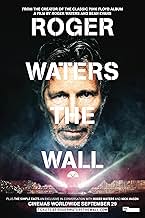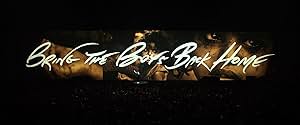Ajouter une intrigue dans votre langueDetails one of the most elaborately staged theatrical productions in music history as Pink Floyd frontman Roger Waters performs the band's critically acclaimed album The Wall in its entirety... Tout lireDetails one of the most elaborately staged theatrical productions in music history as Pink Floyd frontman Roger Waters performs the band's critically acclaimed album The Wall in its entirety.Details one of the most elaborately staged theatrical productions in music history as Pink Floyd frontman Roger Waters performs the band's critically acclaimed album The Wall in its entirety.
- Réalisation
- Scénario
- Casting principal
- Récompenses
- 1 nomination au total
- Guitars
- (as David Kilminster)
- Vocals
- (as Robbie Wycoff)
Avis à la une
The segments with Roger Waters away from the stage gave me a rich insight into how he came to create the story of 'The Wall'. No doubt that creating this production was cathartic for Mr. Waters. The common thread that 'The Wall' shares with the 'classics' of all genres is that it is as relevant (if not more so) today as when it was originally penned.
But now Waters is not the same man he was when he wrote it 36 years ago and went on your with it with Floyd back in 1980/81; he's an old man with kids and grandkids, and this movie is really about reflecting back again. And again, and again at the loss of something very heavy, this being Eric Fletcher Waters in 1944 in Anzio, and if there's any through-line with the documentary scenes it's that Waters is going to the same site where his dad died. Will he get catharsis? Are even told as much? Who knows.
In a strange way, between this rock show and Waters in real life as we see him in this movie, he's like the rock star equivalent of a superhero; not on the side of doing things heroic, rather I mean the origin story, as we know many/most comic book heroes have in their bones loss. If the loss of Bruce Wayne's parents shaped him to become Batman, then one wonders watching this if Waters' dad made him make The Wall; certainly it wouldn't have the same sort of emotional punch without the loss. That said, it's pushed so much in this story that there's not much room for anything else; there are a couple of anecdotes told between Waters and an old childhood friend, plus his own kids who join him to see his grandfather's grave (which, in a coincidence I didn't know, died as well in WW1 when EF Waters was just two), but aside from that it's all about the loss to the point where it's constricting.
But hey, this IS also about the performance of The Wall concert itself, right? That itself is one of the marvels of rock performances, and has been for so long, though even this is updated from what it used to be - when Pink Floyd first performed the concerts, the brick-by-brick set up of a wall being built in the first half, then finished by the end of 'Goodbye Cruel World', and the rest of the show performed with a wall put up between band and audience (a metaphor for the ages), it was innovative and stark and original. Here it's used again, though this time in 2015 this along with the creator has changed, and audiences seeing it in person get a giant screen projected on the Wall.
I wonder if this has the same effect as it did back in the early 80's, when such technology didn't exist, but it does provide us with a lot of images that compliment and enhance what we're hearing and seeing on stage - pictures of veterans and other civilians that have died in war in the early part of the concert (during "Thin Ice") and, to a not as effective sensation, girls acting all catty and 'sensual' during "Young Lust". What one wants to see is the band perform really, and they all do a smashing good job (GE Smith one of them); one unintentionally ironic part is that The Wall is meant as the metaphor in part for what Waters felt in the late 70's, being disconnected from the very audience he was playing for, and now the filmmakers have lots and lots of shots of the audience, enraptured and loving what they're seeing on stage.
Of course there are only so many ways to shoot a live concert, and if it was focused just on the stage Waters and Evans wouldn't get enough coverage. But it is funny (not in a 'ha-ha' way, just amusing) that the show is both shown as being about in large part a rock start going full blown fascist dictator and stone-cold depressive ("One of My Turns") to an audience that is totally connected, albeit many of them with their phones out, with that being their own wall, so to speak, if one reads into it that way. But ultimately the performance by Waters and his band is so strong and the presentation so lively and inventive in its roots, from the inflatable figures on stage of the teacher and the black pig over the audience, to the Scarfe animations occasionally thrown on the video on the wall, that I couldn't help but be entertained on that audio-visual level alone.
So to sum it all up: the documentary segments are well-shot and interesting on their own, and they'd make for a helluva strong short documentary on tracking the kind of loss that you can never fully get over, but it breaks up the flow of what is the MAIN story, the Wall story itself. It's maybe a more mature and thoughtful film than Parker/Scarfe/Waters' production in 82, but as far as just pure rock and roll experimentation brilliance it doesn't compare. One last nice touch: Waters playing 'When the Tigers Broke Free' on trumpet for his dad.
Thirty-six years after the original release, a great number of tours, a movie and a few concerts released on video, some could say Roger Waters wanted to release a "The Wall" concert in 2015 only to cash in, taking advantage of nostalgia and of the value and influence of the work to music: however, this one would be completely wrong.
The movie is a new, and once again, genius approach to the Rock Opera masterpiece. The work was updated carefully, even though it is, almost entirely, timeless. Waters is vulnerable during the cutscenes of this documentary, showing his traumas and personal life, allowing the audience to understand how his loss experiences related to both World Wars forged his personality, while simultaneously creating identification through loss, revolt or the inability that, unfortunately, meets us all in some moment of contemporary life.
But if Waters is vulnerable on the cutscenes, at the stage he is self-assured, proves to be a great frontman and leads his work like no one else could ever do. "The Wall", played in its entirety in this movie (three songs were added to the original album's tracklist) is, undeniably, one of the most important art works of the 20th century. Terrorrism's evil, in any of its forms, and the alienation of the human being due to the lack of empathy of modern society underpins Roger reflections, and allow him to insert his anthropological and social questionings, going way beyond Pink's character.
The movie is very well-directed, with great editing and cinematography. The concert, as fans know, is a spectacle of rock 'n' roll classics played beautifully, an unprecedented visual production and energetic performances from Roger and the band.
The audience's catharsis during Comfortably Numb is something ridiculously emotional, Bring The Boys Back Home can bring us all to tears and Another Brick In The Wall summarizes why Pink Floyd was and still is one of the most enchanting bands ever, justifying The Wall's mythology.
A must-see for rock lovers and highly recommended to people interested in complex narratives, social criticism and great audiovisual spectacles.
10 out of 10
Le saviez-vous
- AnecdotesRoger Waters told that the greatest audience was in the concert of Istanbul. However, this concert was not filmed for this movie, because the decision of which concerts will be filmed is made before gigs occurring.
- GaffesAt the final war memorial, Roger sits down with his bag beside him. He then moves to sit on a different memorial with his horn leaving his bag behind. In the new location, one camera angle incorrectly shows a bag beside him while another shows no bag.
- Citations
Roger Waters: On the tour, I invite about 20 wounded veterans to the show each night. There was one guy. And he just nodded, and then he put his hand out, and I grabbed his hand like that to shake his hand, and he wouldn't let go of my hand. So I thought: "Okay, he obviously wants to say something." And he stood there and looked at me straight in the eyes. Very kind of weird, piercing look. And then he said..."Your father would be proud of you." And it was a very weird moment. I just... I just sort of turned to jelly, really. And I felt myself welling up. I'll never forget him.
- ConnexionsReferences Pink Floyd: The Wall (1982)
Meilleurs choix
- How long is Roger Waters: The Wall?Alimenté par Alexa
Détails
Box-office
- Montant brut mondial
- 2 214 417 $US
- Durée2 heures 12 minutes
- Couleur
- Mixage
- Rapport de forme
- 2.39:1
Contribuer à cette page
























